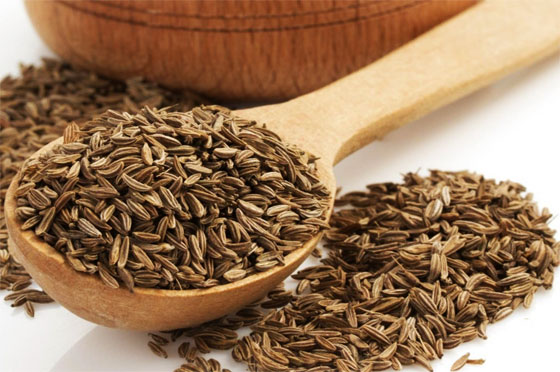Six health benefits of cumin, a superfood full of minerals and omega-3s
Cumin is an incredible spice with many culinary uses. Studies even suggest that cooking with cumin regularly can help boost your overall well-being, from your digestion to your heart health.
Cumin (Cuminum cyminum) originated in the Middle East and it belongs to the same family as carrots and parsley. Cumin seeds, which is what you use to cook with, are the dried seeds of the cumin plant.
Cumin is available in both ground and whole seed form at most grocery stores. You can buy brown, green and white varieties of ground and whole cumin seeds. As a spice, cumin has a unique earthy flavor and warm aroma. It is often described as a combination of both bitterness and sweetness and it’s a versatile spice for different dishes.
Black cumin seeds (Nigella sativa) come from a different plant family, that shares a lineage with buttercups instead of carrots. Black cumin tastes more peppery compared to regular cumin.
6 reasons to cook with cumin
Both cumin and black cumin are nutrient-rich superfoods and they contain minerals such as:
• Calcium
• Iron
• Magnesium
• Manganese
• Omega-3 fatty acids
• Omega-6 fatty acids
Additionally, cumin is full of antioxidants or beneficial compounds that help minimize inflammation and prevent oxidative damage in the body. Cumin contains antioxidants like alkaloids, flavonoids, phenols and terpenes.
Flavonoids are a type of polyphenol or a beneficial compound in plants that help attract pollinating insects. These compounds can also help fight environmental stresses like microbial infections and regulate cell growth.
Research has found that flavonoids are rich in antioxidants and that they help fight inflammation often linked to diseases like diabetes, heart disease and even cancer.
Cumin can help improve markers of heart health
In a 2018 study, researchers worked with 40 volunteers diagnosed with Hashimoto’s thyroiditis, a condition linked to “significantly altered blood cholesterol levels and glucose control.” The participants where given either two grams of powdered black cumin seeds or a placebo daily for eight weeks. The volunteers who received the cumin experienced a significant reduction in weight and body mass index, LDL (low-density lipoprotein) or “bad” cholesterol levels and serum triglycerides. Those in the same group also experienced a significant increase in their HDL (high-density lipoprotein) or “good” cholesterol levels after eight weeks of supplementation.
Cumin can help support blood sugar management
In a study published in 2016, scientists analyzed the effects of vitamin E versus cumin essential oil on HbA1C, a long-term indicator of blood sugar control in 95 patients with diabetes. Three volunteer groups took either 800 international units (IU) of vitamin E, 25 mg of cumin oil, or a placebo, with all three groups supplementing daily for three months. The researchers measured the participants’ markers of blood sugar control and results revealed that cumin had a “broader and more significant positive impact” on blood sugar control compared to vitamin E or the placebo.
Cumin can help promote weight loss and maintenance
Data has also revealed that cumin can help you lose weight, which then helps reduce your risk of developing chronic disease. For a 2015 study, researchers evaluated the effects of cumin supplementation on weight loss and metabolic profiles of people who were overweight. In the study, the 78 overweight volunteers were divided into three groups:
1. One group received one cumin capsule.
2. Another group received one orlistat120 capsule, a drug often used to inhibit absorption of dietary fat.
3. The third group was given a placebo.
The volunteers supplemented with cumin, medication, or a placebo three times daily for eight weeks. Results revealed that cumin supplementation was just as effective as the orlistat120 medication on weight loss and BMI (body mass index) reduction. The cumin also helped improve insulin sensitivity.
Cumin can also improve digestion
For a 2013 study, scientists worked with 57 patients with irritable bowel syndrome (IBS). The patients were given 20 drops of cumin essential oil per day for four weeks to see if it improved their symptoms. Those with IBS often suffer from intermittent bouts of abdominal pain, bloating, constipation, diarrhea, gas and other changes in their bowel habits. Results showed that cumin extract can be used as an inexpensive and convenient option to improve digestive health by “increasing the activity of digestive enzymes, speeding up the digestion process, and increasing the release of bile from the gut.”
Cumin can help prevent inflammation and have anticancer properties
Data from test tube studies suggests that cumin essential oil may have anti-inflammatory effects. Other studies highlight how cumin extract can help suppress tumor growth, reduce tumor presence and slow the progression of cancer. In a 1992 study, scientists reported that out of nine popular spices and herbs, cumin and basil had the most anticancer properties. According to research, black cumin seed extract has anticancer properties in both test tube and in vivo studies. Black cumin contains a potent compound called thymoquinone that has anti-inflammatory and anticancer properties. Other studies have found that the thymoquinone in black cumin can help halt inflammatory processes in the body and can even help prevent cancer.
Cumin may also have antifungal and antibacterial properties
Cumin, particularly cumin essential oil, possesses antimicrobial properties. Experts believe that the germ-fighting properties of cumin can be traced to the bioactive compounds cuminaldehyde, cymene and terpenoids. Test tube studies also suggest that cumin essential oil can help fight common foodborne microbes like E. coli, S. aureus and S. faecalis, along with common fungi found in foods. Data also revealed that heating cumin using a stovetop helped boost its antimicrobial effects.
Considerations when using cumin
Cumin is considered generally safe for use and consumption, but there are some instances where you need to be careful about consuming cumin. Some people may even need to avoid it altogether.
To date, there is no widely agreed upon dose for cumin supplementation. However, a typical dose of cumin supplements is around 300-600 mg per day.
The spice is considered largely non-toxic, but consuming doses of cumin larger than this may cause negative side effects such as:
• Reducing blood sugar. If you have low blood sugar levels or are taking blood sugar-lowering medication for diabetes, use cumin sparingly.
• Causing allergic reactions in some people. While allergies to spices are very rare, some report cases of anaphylaxis caused by ingesting cumin.
• Causing miscarriages. When taken in high doses, cumin can stimulate uterine contractions. If you are pregnant or trying to become pregnant, avoid cumin, especially in large doses or in supplemental form.
How to use cumin in the kitchen
Studies on cumin often use the spice in the form of seed oil or extract, but you can also use ground or dried cumin when cooking to reap similar health benefits. You can purchase whole and ground cumin seeds in the baking aisle of most grocery stores. Alternatively, you may find cumin in international markets catering to Indian, Latin American, Middle Eastern, or North African cuisines.
Use cumin when cooking the following dishes:
• Cooked grain dishes
• Curries
• Sauces for pastas and stir-fries
• Seasoned or cooked vegetables like roasted carrots with cumin and honey
• Soups
• Stir-fried beef
• Taco seasoning
Compared to cumin essential oil, black seed oil has an intense flavor. For best results, consume black seed oil raw or unheated.
Other ways to use black seed oil include:
• Taking it straight by the teaspoonful, or with some honey and lemon juice. Drink a glass of water or tea to wash it down.
• Drizzling it on salads like a dressing.
• Mixing it into teas, smoothies, or coffee.
Use cumin to make delicious salads and hearty stews that will improve your digestion and boost your heart health.
yogaesoteric
November 7, 2021
Also available in:
 Français
Français


